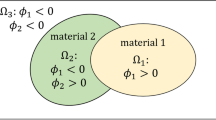Abstract
A mesh-free minimum length method (MLM) has been proposed for 2-D solids and heat conduction problems. In this method, both polynomials as well as modified radial basis functions (RBFs) are used to construct shape functions for arbitrarily distributed nodes based on minimum length procedure, which possess Kronecker delta property. The shape functions are then used to formulate a mesh-free method based on weak-form formulation. Both Gauss integration (GI) and stabilized nodal integration (NI) are employed to numerically evaluate Galerkin weak form. The numerical examples show that the MLM achieves better accuracy than the 4-node finite elements especially for problems with steep gradients. The method is easy to implement and works well for irregularly distributed nodes. Some numerical implementation issues for MLM are also discussed in detail.
Similar content being viewed by others
References
Atluri SN, Zhu T (1998) A new meshless local Petrov-Galerkin (MLPG) approach in computational mechanics. Comput Mech 22:117–127
Belytschko T, Lu YY, Gu L (1994) Element-free Galerkin methods. Int J Numer Meth Eng 37:229–256
Chen JS, Wu CT, Belytschko T (2000) Regularization of material instabilities by meshfree approximations with intrinsic length scales. Int J Numer Meth Engng 47:1303–1322
Chen JS, Wu CT, Yoon S, You Y (2001) A stabilized conforming nodal integration for Galerkin meshfree method. Int J Numer Meth Eng 50:435–466
Dai KY, Liu GR, Lim KM, Gu YT (2003) Comparison between the radial point interpolation and the Kriging based interpolation used in mesh-free methods. Comput Mech 32:60–70
Gingold RA, Monaghan JJU (1977) Smooth particle hydrodynamics: theory and applications to non-spherical stars. Man Not Roy Astron Soc 181:375–289
Golberg MA, Chen CS, Bowman H (1999) Some recent results and proposals for the use of radial basis functions in the BEM. Eng Anal Bound Elem 23:285–296
Krongauz Y, Belytschko T (1997) Consistent pseudo-derivatives in meshless method. Int J Numer Meth Engng 146:371–386
Liszka T, Orkisz J (1980) The finite difference methods at arbitrary irregular grids and its applications in applied mechanics. Comput Struct 11:83–95
Liu GR (2002) Mesh-free methods: moving beyond the finite element method. CRC Press, Boca Raton, FL
Liu GR, Gu YT (2003) A mesh-free method: mesh-free weak-strong (MWS) form method for 2-D solids. Comput Mech 33:2–14
Liu GR, Han X (2003) Computational inverse techniques in Nondestructive evaluation. CRC Press, Boca Raton, FL
Liu GR, Liu MB (2003) Smooth particle hydrodynamics: a mesh-free particle method. World Scientific, New Jersey, NJ
Liu GR, Wu YL, Ding H (2004) Mesh-free weak-strong (MWS) form method and its application to incompressible flow problems. Int J Numer Meth Fliuds 46:1025–1047
Liu WK, Jun S, Zhang YF (1995) Reproducing kernel particle methods. Int J Numer Meth Fl 20:1081–1106
Timoshenko SP, Goodier JN (1970) Theory of elasticity, 3rd edn. McGraw-Hill, New York, NY
Wang JG, Liu GR (2002a) A point interpolation meshless method based on radial basis functions. Int J Numer Meth Eng 54:1623–1648
Wang JG, Liu GR (2002b) On the optimal shape parameters of radial basis functions used for 2D meshless methods. Comput Meth Appl Mech Eng 191:2611–2630
Yoo JW, Moran B, Chen JS (2004) Stabilized conforming nodal integration in the natural-element method. Int J Numer Meth Eng 60:861–890
Author information
Authors and Affiliations
Corresponding author
Rights and permissions
About this article
Cite this article
Liu, G.R., Dai, K.Y., Han, X. et al. A mesh-free minimum length method for 2-D problems. Comput Mech 38, 533–550 (2006). https://doi.org/10.1007/s00466-005-0003-z
Received:
Accepted:
Published:
Issue Date:
DOI: https://doi.org/10.1007/s00466-005-0003-z




